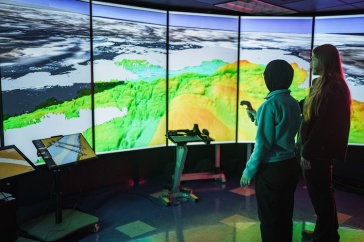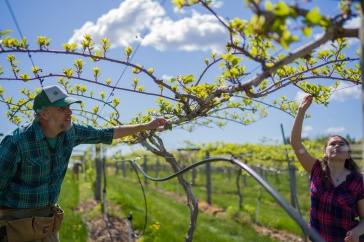
Serita Frey, professor of soil microbial ecology at UNH, has been named a fellow of the Ecological Society of America.
Frey was elected to this lifelong appointment for “substantial contributions to our understanding of how soil organisms respond to environmental change and in turn impact the services that ecosystems provide across both space and time, leadership within the field of ecology, service to the Ecological Society of America, and tireless mentorship of the next generation of ecologists.”
“Serita Frey is an outstanding scientist, conducting world-class research with tremendous impact on our understanding of agricultural and natural ecosystems,” says Mark Ducey, chair of the UNH department of natural resources and the environment. “The opportunity for our students — both undergraduates and graduate students — to be mentored by her and to participate in her research is amazing.”
“Serita Frey is an outstanding scientist, conducting world-class research with tremendous impact on our understanding of agricultural and natural ecosystems.”
Frey’s research looks at microorganisms in soil and how they respond to environmental changes caused by human activities. Specifically, she and her lab are interested in how climate change, nitrogen deposition, agricultural management, and invasive species affect the composition and diversity of soil microbial communities and microbial-mediated carbon and nitrogen cycles. “While focused at the microbial scale, my research really tries to bridge the micro and the macro,” she says.
Her research team maintains five long-term global change experiments at the Harvard Forest Long-term Ecological Research (LTER) site and a statewide, distributed soil sensor network in New Hampshire.
Last year, the Web of Science Group recognized her as one of the most highly cited researchers in the world, a prestigious distinction earned by fewer than 0.1 percent of scientists globally. She was among an exclusive group of highly influential researchers that included 23 Nobel laureates and 57 citation laureates -- individuals recognized by the Web of Science Group, through citation analysis, as “of Nobel class” and potential Nobel Prize recipients.
“In addition to Dr. Frey’s recognized research excellence, she contributes very strongly in all areas of our academic enterprise. Among these, she is a committed and competent advisor to our students, an instructional innovator, and leads our college-wide committee charged with helping to advance the diversity, equity and inclusivity of our community. Serita is an outstanding all-around university professor, and we’re very pleased at this recognition through the ESA Fellow Award,” says Jon Wraith, dean of the UNH College of Life Sciences and Agriculture and director of the NH Agricultural Experiment Station, with which Frey is a researcher.
Frey received her bachelor’s and master’s degrees from the University of Virginia and her Ph.D. from Colorado State University. She is editor-in-chief for Issues in Ecology. Her honors include UNH Outstanding Associate Professor of the Year, Distinguished Ecologist Alumna Award from the Graduate Degree Program in Ecology at Colorado State University, Bullard Fellowship from Harvard University, and an NSF Faculty Early Career Development Award.
-
Written By:
Lori Tyler Gula, PhD | NH Agricultural Experiment Station | lori.gula@unh.edu | 603-862-1452
















































